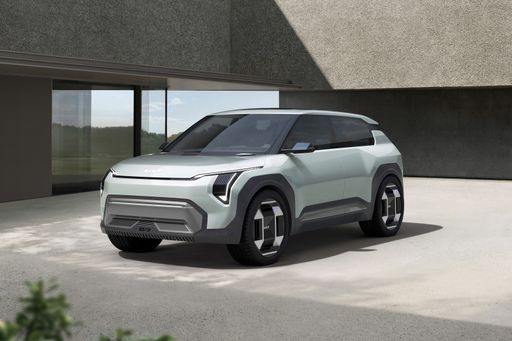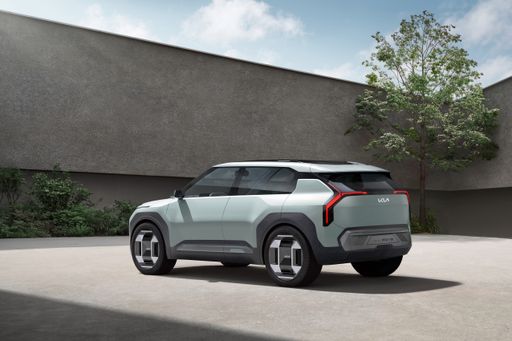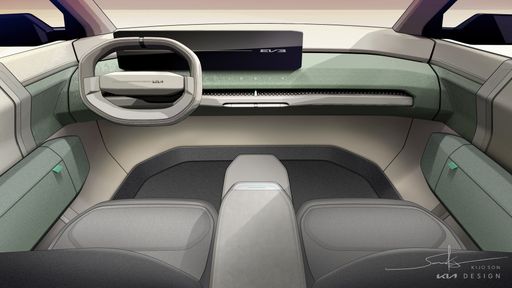Hyundai Bayon vs Kia EV3 – Performance, range & efficiency compared
Both models have their strengths – but which one suits you more?
Compare performance, efficiency, price and space directly: Hyundai Bayon or Kia EV3?
Costs and Efficiency:
Price and efficiency are often the first things buyers look at. Here it becomes clear which model has the long-term edge – whether at the pump, the plug, or in purchase price.
Hyundai Bayon has a clearly advantage in terms of price – it starts at 20100 £, while the Kia EV3 costs 30800 £. That’s a price difference of around 10791 £.
Engine and Performance:
Power, torque and acceleration are the classic benchmarks for car enthusiasts – and here, some clear differences start to show.
When it comes to engine power, the Kia EV3 has a convincingly edge – offering 204 HP compared to 100 HP. That’s roughly 104 HP more horsepower.
In acceleration from 0 to 100 km/h, the Kia EV3 is decisively quicker – completing the sprint in 7.50 s, while the Hyundai Bayon takes 11.30 s. That’s about 3.80 s faster.
In terms of top speed, the Hyundai Bayon performs hardly perceptible better – reaching 179 km/h, while the Kia EV3 tops out at 170 km/h. The difference is around 9 km/h.
There’s also a difference in torque: Kia EV3 pulls clearly perceptible stronger with 283 Nm compared to 200 Nm. That’s about 83 Nm difference.
Space and Everyday Use:
Whether family car or daily driver – which one offers more room, flexibility and comfort?
Both vehicles offer seating for 5 people.
In curb weight, Hyundai Bayon is significantly lighter – 1170 kg compared to 1800 kg. The difference is around 630 kg.
In terms of boot space, the Kia EV3 offers to a small extent more room – 460 L compared to 411 L. That’s a difference of about 49 L.
In maximum load capacity, the Kia EV3 performs minimal better – up to 1251 L, which is about 46 L more than the Hyundai Bayon.
When it comes to payload, Kia EV3 barely noticeable takes the win – 470 kg compared to 465 kg. That’s a difference of about 5 kg.
Who comes out on top?
Overall, the Kia EV3 shows itself to be wins the duel decisively and secures the title of DriveDuel Champion.
It convinces with the more balanced overall package and proves to be the more versatile choice for everyday use.

Kia EV3
Hyundai Bayon
The Hyundai Bayon is a compact crossover that effortlessly merges practicality with modern design. Its sleek exterior and spacious interior make it an ideal choice for urban settings and longer journeys alike. With a focus on comfort and connectivity, this vehicle provides a smooth driving experience paired with advanced technology features.
details @ hyundai.news
@ hyundai.news
 @ hyundai.news
@ hyundai.news
 @ hyundai.news
@ hyundai.news
 @ hyundai.news
@ hyundai.news
 @ hyundai.news
@ hyundai.news
Kia EV3
The Kia EV3 is a testament to innovative design and sustainable driving, featuring a sleek exterior that melds form with function. Inside, the cabin offers a harmonious blend of modern technology and comfort, making every journey enjoyable for both driver and passengers. With its impressive range and eco-friendly credentials, the EV3 positions itself as a competitive player in the evolving landscape of electric vehicles.
details @ kiamedia.com
@ kiamedia.com
 @ kiamedia.com
@ kiamedia.com
 @ kiamedia.com
@ kiamedia.com

|

|
|
|
|
Costs and Consumption |
|
|---|---|
|
Price
20100 - 25800 £
|
Price
30800 - 41700 £
|
|
Consumption L/100km
5.4 - 5.5 L
|
Consumption L/100km
-
|
|
Consumption kWh/100km
-
|
Consumption kWh/100km
14.9 - 16.2 kWh
|
|
Electric Range
-
|
Electric Range
436 - 605 km
|
|
Battery Capacity
-
|
Battery Capacity
58.3 - 81.4 kWh
|
|
co2
124 g/km
|
co2
0 g/km
|
|
Fuel tank capacity
40 L
|
Fuel tank capacity
-
|
Dimensions and Body |
|
|---|---|
|
Body Type
SUV
|
Body Type
SUV
|
|
Seats
5
|
Seats
5
|
|
Doors
5
|
Doors
5
|
|
Curb weight
1170 - 1195 kg
|
Curb weight
1800 - 1885 kg
|
|
Trunk capacity
411 L
|
Trunk capacity
460 L
|
|
Length
4180 mm
|
Length
4300 - 4310 mm
|
|
Width
1775 mm
|
Width
1850 mm
|
|
Height
1500 mm
|
Height
1560 - 1570 mm
|
|
Max trunk capacity
1205 L
|
Max trunk capacity
1251 L
|
|
Payload
460 - 465 kg
|
Payload
470 kg
|
Engine and Performance |
|
|---|---|
|
Engine Type
Petrol
|
Engine Type
Electric
|
|
Transmission
Manuel, Automatic
|
Transmission
Automatic
|
|
Transmission Detail
Manual Gearbox, Dual-Clutch Automatic
|
Transmission Detail
Reduction Gearbox
|
|
Drive Type
Front-Wheel Drive
|
Drive Type
Front-Wheel Drive
|
|
Power HP
100 HP
|
Power HP
204 HP
|
|
Acceleration 0-100km/h
11.3 - 12.4 s
|
Acceleration 0-100km/h
7.5 - 7.9 s
|
|
Max Speed
176 - 179 km/h
|
Max Speed
170 km/h
|
|
Torque
172 - 200 Nm
|
Torque
283 Nm
|
|
Number of Cylinders
3
|
Number of Cylinders
-
|
|
Power kW
74 kW
|
Power kW
150 kW
|
|
Engine capacity
998 cm3
|
Engine capacity
-
|
General |
|
|---|---|
|
Model Year
2024
|
Model Year
2024
|
|
CO2 Efficiency Class
D
|
CO2 Efficiency Class
A
|
|
Brand
Hyundai
|
Brand
Kia
|
What drivetrain options does the Hyundai Bayon have?
The Hyundai Bayon is available as Front-Wheel Drive.
The prices and data displayed are estimates based on German list prices and may vary by country. This information is not legally binding.
